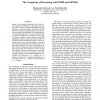Free Online Productivity Tools
i2Speak
i2Symbol
i2OCR
iTex2Img
iWeb2Print
iWeb2Shot
i2Type
iPdf2Split
iPdf2Merge
i2Bopomofo
i2Arabic
i2Style
i2Image
i2PDF
iLatex2Rtf
Sci2ools
AI
2015
Springer
2015
Springer
The complexity of reasoning with FODD and GFODD
Recent work introduced Generalized First Order Decision Diagrams (GFODD) as a knowledge representation that is useful in mechanizing decision theoretic planning in relational domains. GFODDs generalize function-free first order logic and include numerical values and numerical generalizations of existential and universal quantification. Previous work presented heuristic inference algorithms for GFODDs. In this paper, we study the complexity of the evaluation problem, the satisfiability problem, and the equivalence problem for GFODDs under the assumption that the size of the intended model is given with the problem, a restriction that guarantees decidability. Our results provide a complete characterization. The same characterization applies to the corresponding restriction of problems in first order logic, giving an interesting new avenue for efficient inference when the number of objects is bounded. Our results show that for Σk formulas, and for corresponding GFODDs, evaluation a...
| Added | 14 Apr 2016 |
| Updated | 14 Apr 2016 |
| Type | Journal |
| Year | 2015 |
| Where | AI |
| Authors | Benjamin J. Hescott, Roni Khardon |
Comments (0)

